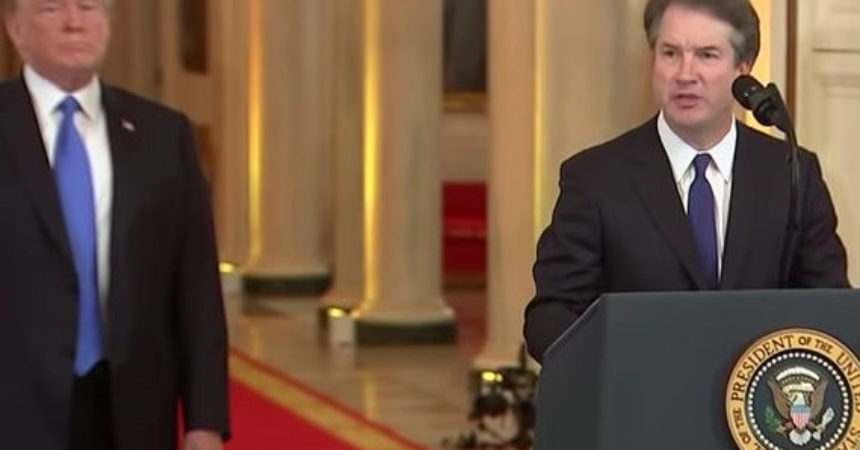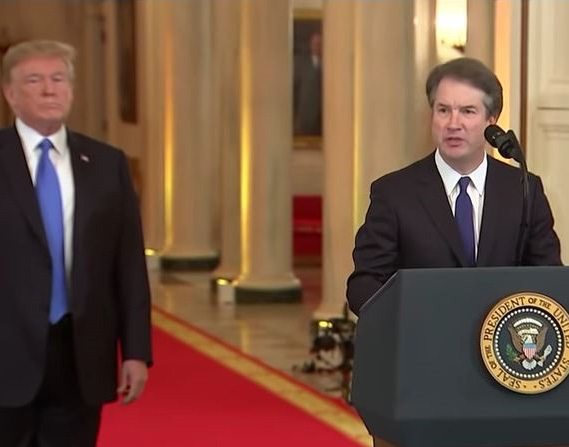
All eyes on U.S. Supreme Court: Fiery nomination battle expected

President Donald Trump introduces his nominee, Judge Brett Kavanaugh, for the U. S. Supreme Court.
By Barringtonn M. Salmon
Trice Edney News Wire
President Donald Trump has announced his choice for the next U. S. Supreme Court justice. He is U. S. Circuit Judge Brett Kavanaugh of Washington, D.C., a nominee who has already drawn fire from Democratic leader Chuck Schumer and the NAACP.
“Brett Kavanaugh is a dangerous ideologue whose extreme views on civil rights would solidify a far-right majority on the Supreme Court,” the NAACP said in a statement within hours after Trump’s prime-time announcement July 9. “Coming after Neil Gorsuch’s appointment, a Kavanaugh confirmation would re-make the Court in President Trump’s own image. This prospect is unacceptable to the American people, and the NAACP is ready to lead the fight of a generation.”
The statement continued, “The NAACP knows Judge Kavanaugh well. We opposed his confirmation to the D.C. Circuit for good reason. In his 12 years on the bench, he has proven us correct. He has been a strong and consistent voice for the wealthy and the powerful. Over and over again, he has ruled against civil rights, workers’ rights, consumer rights, and women’s rights. With a Justice Kavanaugh on the Supreme Court, we could see reversals of hard-won gains securing equal opportunity in education, employment and housing. We could see further exclusion of communities of color from participation in our democracy. We could see racism continue to flourish within the criminal justice system. We could see the elimination of effective tools for proving discrimination. We could see the overturning of Roe v. Wade and the guarantee to accessible health care for millions.”
The nomination is only the beginning. After lengthy hearings before the U. S. Senate Judiciary Committee, he will only be confirmed if he receives a majority of the Senate.
“President Trump with the nomination of Judge Kavanaugh has fulfilled two of his campaign promises — first to undo women’s reproductive freedom and second to undo the ACA (Affordable Care Act),” said Senate Minority Leader Chuck Schumer in a CBS News interview. “So, I will oppose him with everything I’ve got.”
Kavanaugh would replace retiring Justice Anthony Kennedy, whose decision to leave the highest court caught many by surprise and has ignited emotions ranging from alarm to panic to concern among civil rights, human rights, and women’s rights advocates, centrists and progressives.
It has also produced undisguised jubilation within conservative circles at the prospect of a conservative, and possibly far-right, jurist being placed on the court.
If he is successful, says Kami Chavis, a law professor at Wake Forest University in North Carolina, Trump would orchestrate a seismic shift on the closely divided Supreme Court.
Kennedy, 81, announced his July departure on June 27, which set in motion hurried efforts by Trump and Senate Majority Leader Mitch McConnell to select a nominee and begin the nomination process ahead of mid-term, elections in November respectively.
“Well, I guess I wasn’t surprised given Justice Kennedy’s age and the talk, so his retirement was reasonable. But my first reaction was one of fear,” said Chavis. “Justice Kennedy was the deciding vote on a number of cases concerning civil and human rights. This is going to be a seismic and paradigmic shift. If there was any Republican serving as president, there would be the expectation of change but with this administration, the change could be damaging. I think we will see a much more conservative court with a lot of opinions that will be hostile and will change our notions of Civil Rights while adversely affecting Black folks, women and the poor.”
Kristen Clarke, president and executive director of the lawyers Committee for Civil Rights Under Law, agrees there’s much at stake with this Supreme Court vacancy.
“Justice Kennedy has been the swing vote on a number of core Civil Rights issues. This could transform African American life for years to come,” said Clarke. “There’s no doubt about the impact – in voting rights, criminal justice and women’s issues. The Senate must do its job of vetting to ensure that the nominee is fair, unbiased and faithful to applying and interpreting the law.”
Clarke says every senator has an obligation to properly vet the nominee. “It’s their duty,” Clarke said. “This should not be a partisan battle, but we’ll see. We must fight to preserve the integrity of the court and not allow it to fall victim to the political gamesmanship that sometimes takes over politics.”
Clarke warns the importance of this appointment cannot be underestimated.
“This is a huge issue,” Clarke said. “There are 140 vacancies in federal courts. The judiciary has always mattered to Black people because it is a place of last resort. Ninety-nine percent of cases are heard in federal and district courts. Ninety-one percent of those Trump is putting forward are White and male and they are the fringe. He’s turning back the clock to the Jim Crow era.”
Trump has been packing the lower courts since taking office and he has been aided by McConnell, who blocked Obama nominees and left them open for Trump to fill. McConnell refused to even consider or meet with Obama pick Merritt Garland and held that seat open for Trump to nominate Neil Gorsuch. In the past 15 months, the administration has retreated from the government’s legal positions on voting rights and election law, on how workplace disputes are settled, and eroded labor union power, cast off provisions and protections for gay and transgender people.
Attorney General Jeff Sessions has overseen restrictions and other limits on affirmative action and other legal remedies, advanced a hard line on immigration, and has pushed to reduce or eliminate women’s reproductive rights, and promoted sharp cutbacks on regulations.
Dwight Kirk, a labor union veteran who’s also involved in public relations, said Kennedy’s announcement and the implications for Black and brown people from an unsympathetic and indifferent right wing court harkens back to before the Brown v Board Supreme Court decision.
“There are those who thought and hoped that the Mueller investigation would slow down or stop this runaway train, but it looks like all institutional power will be aligned against oppressed people,” he said. “The reaction is weird, man. I’ve been talking to folks and this feels like the day after Trump won. People haven’t felt this way since Brown when they knew that the federal government wasn’t on their side…With the Kennedy announcement, all doors are now closed and all these institutions – the Republican Party, Congress and the Court – are aimed at oppressing vulnerable people.”
The NAACP, the nation’s oldest civil rights organization, said the reason for the fight is clear:
“The rights of African Americans to fully participate in democracy and in every facet of social and economic life, on an equal basis, lie in the balance. The next Supreme Court justice will play an outsized role in determining whether African Americans move forward in our journey toward achieving full equality, whether we simply tread water for the next three decades, or whether we slide backward toward our former status as second-class citizens. To each and every Senator, we say: This is THE civil rights vote of your career. We will be watching closely. Make no mistake – we are in the fight of our lives, and we hope you are prepared for battle.”







